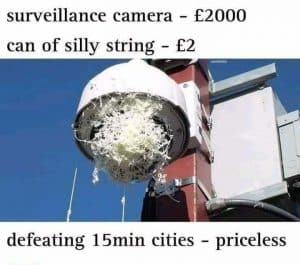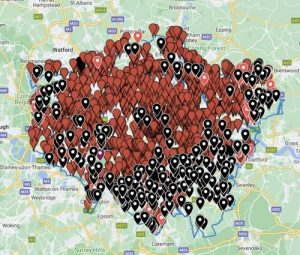The UK is seeing spike in surveillance state activity and a lot of censorship of late which, doesn’t bode well for the rest of the West.
October 9, 2023
By: Bobby Casey, Managing Director GWP

What happens in each country isn’t unto itself policy for the other, but they serve as indicators for the other. The US exported a lot of its cultural issues and turmoil to the UK… some of which were rather irrelevant to the UK. For example, “hands up, don’t shoot” makes sense for the US since the police are armed; but doesn’t make sense for the UK where their police are not armed.
London has a surveillance state that is only rivaled by cities in China and a few in India. It was ranked third in the world, in fact.
The latest in surveillance breakthroughs in the UK is called Ulez cameras:
London’s Ultra Low Emission Zone (Ulez) was expanded to cover the entire capital and beyond on August 29, 2023 and there have been concerns that the cameras were at risk of being vandalised.
The scheme, which aims to reduce air pollution in the city, requires drivers with non-compliant vehicles to pay a fee of £12.50 every time they drive around London.
It’s part of their Green Agenda, you see. From the country that requires you to buy a license to own a TV, comes the city that has 24 hour cameras to detect older and more polluting vehicles. Those driving vehicles that do not meet the Ulez emission standards will be fined a £12.50 daily fee or risk a £180 fine.
While the mayor of London, Sadiq Khan, is being praised for his bravery in passing this legislation, the 80% disapproval rate for this policy believes otherwise.
A vigilante group known as Blade Runners, have been dismantling these cameras with a handful of everyday tools. While technically illegal, they seem to be receiving more praise than grief.

And of course they are right to be frustrated, as it is absolutely a money grab no different than any other citation with no victim. How does someone paying 12 quid make London safer? And what class of people exactly do they think have these higher emission cars?
It’s a racket and Londoners know it. 80% of them are against it, and the mayor is still insisting that those who oppose them are “far right”.
An Sunday Times article from 2018 indicates nearly nine arrests per day were happening in the UK over online posts and comments.
But in 2022, a British veteran was arrested for sharing the new Pride flag which when arranged a certain way resembled a swastika. He posted it in a group on Facebook asking “What do you think?”.
Recently, Laurence Fox was arrested for voicing his support of the destruction of Ulez cameras. The claim is that he intended to do something about it and for conspiring to do so. Voicing your disapproving thoughts on something is now illegal, and apparently if you are Laurence Fox, you get SIX police officers in your home seizing all of your electronic devices.
He was fired from GB News, not for this arrest, but for making disparaging remarks about a female commentator. In an impassioned discussion about male suicide rates in the UK, she appeared to make light of it. Laurence didn’t take that well, and went off later using her own rhetoric against her. But in doing so, that was considered misogynistic.
So far speaking up about the surveillance state and the double standards in speech are his two major violations. And let’s say this is okay with you. Was it also okay to fire a colleague for calling this out? Was it okay to suspend and possibly fire the host of whose show Fox appeared and said these things? How far are they going to take this?
Russel Brand faced something similar where allegations of sexual assault were made by women, but without even having formal charges leveled against him, he was demonetized.
In 2018 there were two cases of people being arrested and convicted for violating the Communications Act of 2003. First was out of Scotland Count Dankula (Mark Meechan), who made a YouTube video joking about his girlfriend’s dog being a Nazi. He was convicted and sentenced to an 800 pound fine.
The second was a young woman in Liverpool, Chelsea Russel, who lost a friend in a car accident. She posted the lyrics to his favorite song on Instagram. That song happened to be a rap song, with several uses of the N-Word. He was arrested, charged, convicted, fined, sentenced to community service and given a curfew (as a grown adult!).
There’s a third case in the UK, which didn’t violate this act, but apparently violated something. The story is about Isabel Vaughan-Spruce. She was arrested twice: for SILENTLY praying outside an abortion clinic. She was interacting with no one. She didn’t say anything. She just sat there quietly with her thoughts.
Kellie-Jay Keen has been harassed by police for holding public meetings called “Let Women Speak”, where she let’s other women take to a microphone to talk about the trans issues in the country.
You can say that a company can fire anyone at will, that is their right. But in the UK, their broadcasting… even their “independent” broadcasting… must go through their government. They have a bureau called Ofcom. All media must run through through: both online and offline.
So even if Laurence Fox, Dan Wooten, and Calvin Robinson decided to do their own independent thing, Ofcom could prevent the shows from reaching anyone… not much different than how China does this.
The UK recently passed the Online Safety Bill. Of course, it was pushed through as protection for children. But there is no difference in the mechanisms they use to throttle information and access to it.
Beyond specific issues of concern, there is over-arching general worry over the scale of the regulatory burden the legislation will apply to the U.K.’s digital economy — since the rules apply not only to major social media platforms; scores of far smaller and less well resourced online services must also comply or risk big penalties.
There appears to be an imposed orthodoxy in the UK, and all those who are heterodox will be trotted out as examples by pain of the fullest extent of those laws. Free speech isn’t about saying things you like. It’s undertaking the risk of hearing things you don’t like, and responding with your ideas or taking those ideas under advisement.
A free marketplace of anything will have things you don’t like or approve of. Your approval isn’t necessary to allow them to exist. Your approval is only necessary in your purchase of adoption of them. You have the same choice to pass on all of it.
It’s not just the things they say more publicly. It’s the things everyone is doing in the UK. Earlier I mentioned the cameras per capita. Okay. Let’s say that keeps people safe and air clean (it doesn’t, but let’s go with it for a minute).
If you’re wondering just how far the surveillance and control goes, or perhaps you think this is just making mountains of mole hills, check out this link ot Comparitech’s blog. It goes into great (and grave) detail on every tentacles of the UK surveillance state, what it tracks and knows about everyone, and why it’s all legal.
But here’s their net list on how to best protect your privacy, no matter where you are:
- Encryption: You can encrypt your email, cloud storage files, messages and even your devices such as your laptop and mobile phone. Even if your data was requested by the UK government or hacked, it would remain unreadable
- VPN: Be sure to choose a VPN that’s based in a country outside of Five Eyes and isn’t subject to data retention requests. Keep in mind that the safest VPNs don’t keep any logs of your activity.
- Privacy Browser: Privacy browsers include plenty of security features including forced HTTPS and ad-blockers. Combined with a privacy search engine that doesn’t track everything you do online, a privacy browser can help keep your data private.
- Anonymous Email: Anonymous email should have no identifiable connection to you and offer end-to-end encryption which means only the sender and recipient can read a message. A good anonymous email provider won’t keep any IP logs and should also be open source.
- Cryptocurrency: The problem with credit cards and third party services such as PayPal is that they often involve excessive fees and are obviously not anonymous. While cryptocurrency is still in its infancy, an increasing number of merchants are accepting the likes of Bitcoin (you can pay anonymously in bitcoin by using a mixing service beforehand) and other cryptocurrencies such as Monero – a popular privacy coin.
Click here to get a copy of our offshore banking report, or here to become a member of our Insider program, where you are eligible for free consultations, deep discounts on corporate and trust services, plus a host of information about internationalizing your business, wealth and life.

